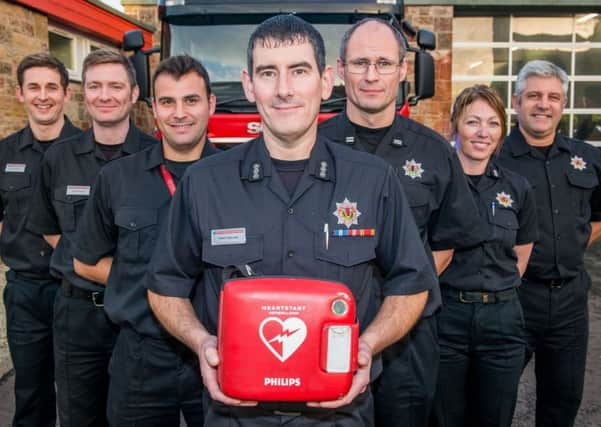Firefighters to be sent to cardiac arrest patients


When the heart stops beating, every second counts as chances of survival fall by 10 to 20 per cent for every minute that passes without CPR or defibrillation.
Shocking statistics reveal that in Scotland just one in 20 people survive to leave hospital after a cardiac arrest, although the figure rises to 17 per cent in Edinburgh.
Advertisement
Hide AdAdvertisement
Hide AdThe Capital’s impressive survival rate is largely thanks to doctors and paramedics from the Resuscitation Rapid Response Unit, based at Edinburgh Royal Infirmary, who are re-writing the rule book on how to tackle the scourge of cardiac arrest.
Now fire stations in Bathgate, Linlithgow and Musselburgh are spearheading a national pilot where firefighters will be sent to the scene ahead of paramedics to raise the chances of a first aider arriving within that crucial five-minute window.
Scottish Fire and Rescue Service (SFRS) chief officer Alasdair Hay said: “Time is absolutely crucial to the chances of survival and we have been exploring with the Scottish Ambulance Service how we can support it in responding to cardiac arrests.
“There are more than 350 fire stations across Scotland and many of these are in remote communities where a paramedic could be a considerable distance away. Our retained and volunteer crews live and work within five to eight minutes of their stations, meaning they may be able to provide a faster response.
“In urban areas where we have stations with 24-hour staffing these crews could be available to immediately respond at times when our ambulance colleagues are busy.”
Community responders are often alerted to cardiac arrest calls alongside the ambulance service to deliver early life-saving care but firefighters with enhanced first aid training will now assist.
Jim Ward, medical director at the Scottish Ambulance Service, said: “If a fire service resource with a crew who are trained to provide high-quality CPR and have a defibrillator is nearer to a potential cardiac arrest than a local community first responder team, then ambulance control will dispatch them at the same time as the ambulance crew, so that they can provide these life saving interventions while the ambulance is on it’s way.”
The move was hailed by Sonia McCraw, president of the Jamie Skinner Foundation (JSF), which was established in memory of 13-year-old footballer Jamie Skinner who suffered a fatal cardiac arrest in 2013.
She said: “It’s an absolutely brilliant idea. To be honest I am not sure why it hasn’t been done before.”
Comment – Page 20